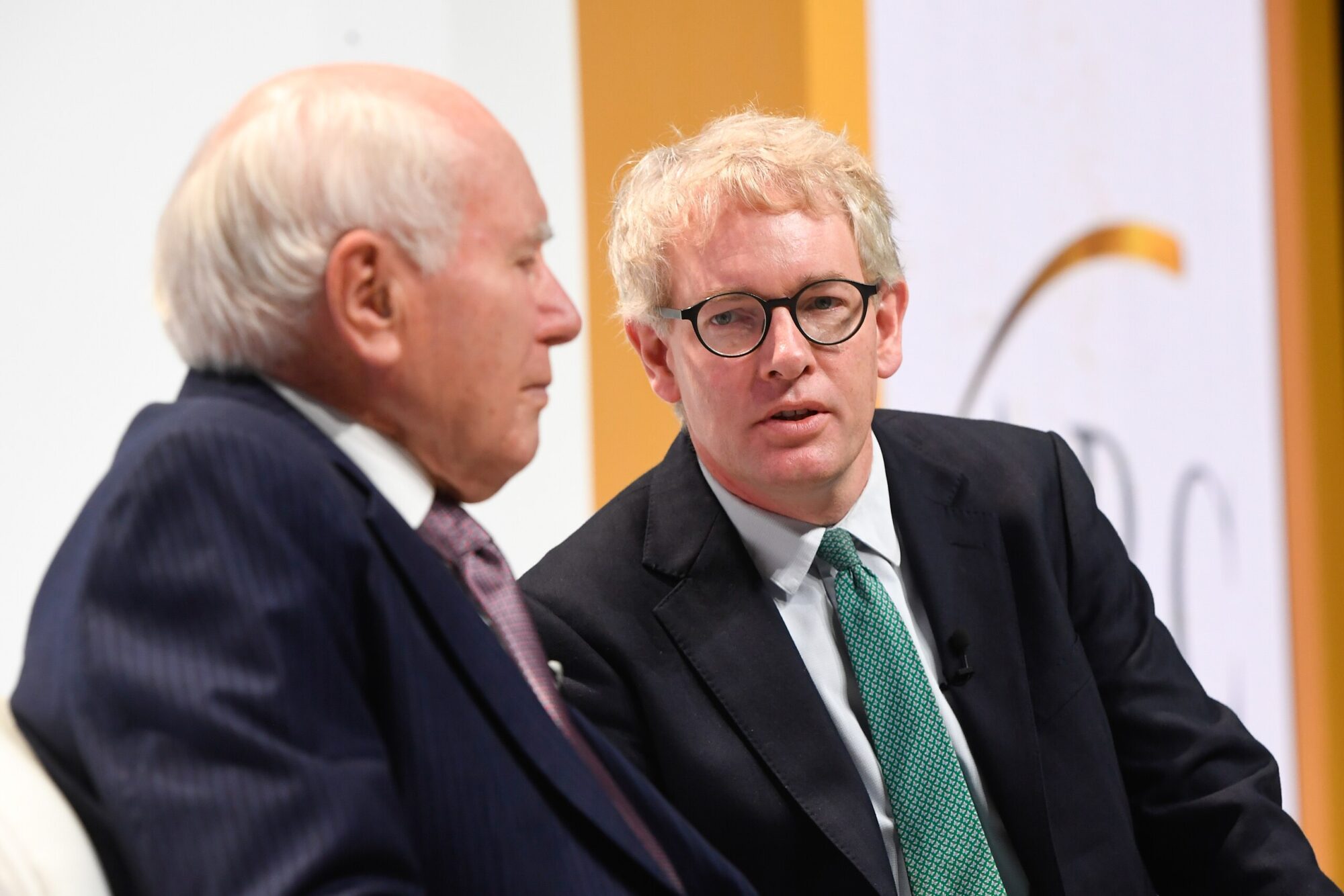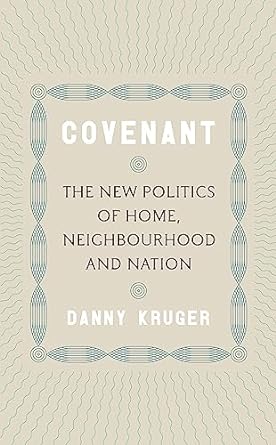
Danny Kruger MP in conversation with John Howard, former Prime Minister of Australia, at the ARC conference, October 2023.

In the beginning, there was a covenant—at least, according to the Bible, the indisputable founding text of European civilization. Once Adam and Eve cast aside this sacred agreement between God and man, then came Noah, Abraham, and Moses. The New Testament posits Christ as their final successor. Later Rousseau, Locke, and Kant attempted to grapple with the idea of such an agreement about man’s rights and responsibilities to one another, rather than—though not necessarily wholly without—a creator.
In Covenant: The New Politics of Home, Neighbourhood and Nation, the British Conservative MP Danny Kruger shows himself to be the latest in a long line of thinkers keen to remodel the covenantal vision in his own era’s image. As Yahweh vowed to bless the Israelites if they kept his law, Kruger offers up bountiful visions of British renewal while strongly implying that such a renaissance will only be possible if we lend our votes to his party at the next election.
With a general audience in mind, Kruger understandably avoids challenging and technical theological and philosophical terms, but he is also unwilling to confront the question of whether transcendent faith is the prerequisite for his political formula. Although Kruger cut his political teeth as former Tory leader David Cameron’s speech writer and briefly worked as No. 10’s political secretary under Boris Johnson, other aspects of his resume—namely an Oxford D.Phil. on the topic—suggest he has, unlike many of his peers, has thought seriously about conservatism.
Still, his approach to Britain’s crisis is but a mile wide and an inch deep. While touching on the issue of education, he refuses to admit that the comprehensive experiment has now had the opportunity to fail several generations of schoolchildren. Is it any surprise that almost a quarter of them think Winston Churchill is a fictional character, while over a half believe that Sherlock Holmes was a real detective? Far from pledging to reintroduce widespread academic selection—instead of selection via postcode and wealth—he ignores the issue altogether. Even our language teachers now routinely struggle with spelling and grammar. This would be unimaginable in Germany, France, or Italy.
What nation can expect to revive itself if academic excellence and meritocracy are dismissed as an afterthought? How can Kruger hope that his program will encourage productive young people not simply to vote for him and his colleagues, but to remain in the United Kingdom and envision a future here?
Despite having voted for strict and dubious COVID-19 measures, such as lockdowns, vaccine passports, and compulsory masking, Kruger complains that, when confronted with national panic, politicians will:
…credulously accept the assurances of the peddlers of tech that the problem will be fixed quickly, cheaply, and without the public minding. And they may be right about the public, for the apparatus will be propelled by an understandable fear in the general population at the threats I have outlined: by our desire for spells and amulets to ward off danger and by our never-to-be-underestimated willingness to trade our freedom for our safety.
While Kruger rightly admonishes his previous support for these policies early on in the text, he neither explains why he supported them nor why—or if —he truly changed his mind. How can one take his reservations about such policies seriously, when he fails to address his own support of them? The most sympathetic of readers may assume that he, like many intellectuals before him, fell into a well-decorated trap with the best of intentions. Still, this is hardly a fitting image for a would-be leader.
His vow to reform ‘impervious’ state bureaucracy, too, falls flat when outside the pages of this slim volume we have all seen that his party has directly incentivized its extremes. Even aside from the well-evidenced political hostility emanating from within the civil service as a whole, there are incidents of the government erecting new threats. For example, in March 2020, the Johnson administration launched a Counter Disinformation Unit to “crack down” on “false coronavirus information online.”
Ministers have long since admitted to having personally intervened in the unit’s work to push for the censorship of “inappropriate” speech, including comments from MPs, journalists, and researchers who questioned government policies. The politicians responsible for this chilling task are unlikely to face any consequences for their actions, aside from being briefly embarrassed by the news cycle. Kruger’s book would be better if it admitted this, and directly hit back at political forces desperate to crush the pursuit of truth and, by extension, warp our sense of reality.
Despite dedicating an entire chapter to issues of life, Kruger focuses entirely on the issue of assisted dying. He appears unwilling to discuss the reason life ought to be universally valued, possibly because it would require him to consider abortion, which, unlike euthanasia, is already legal and common. Such a confrontation may have attracted unwanted clashes with the press and possibly from Kruger’s colleagues. But if a convinced evangelical Christian is not willing to use his public position to confront an uncomfortable moral issue, then who can we expect to do so? Truths about the value of life are not entirely self-evident; not everyone thinks like ‘us’ (or at all). In fact, the cleverer one is, the easier it is to find flimsy post hoc justifications for whatever beliefs one finds most convenient.
His encounter with marriage is less coy, admitting that:
Marriage evolved in the Christian West at least partly as a means of giving women a distinct status, equal in honour and respect to men and protected from the dangers that single women faced in pre-modern society.
In practice, of course, the institution was widely abused both in individual marriages by physically dominant men and in the general culture, which treated women as the property of men and marriage as a means of transferring ownership from the father to the husband. Yet marriage need not be – should never have been – like this.
Kruger is right to confront the downsides of historic marriage conventions, but once again he avoids any serious criticism of the current context, in which divorce laws are arguably far more dangerous than they are liberating. Nor does he acknowledge that a sizeable chunk of divorcees, possibly the majority of them, eventually regret ending a marriage. At the very least, family law ought to distinguish between married couples with and without children, a principle that the Conservative Party has not just abandoned but actively diminished by introducing no-fault divorce laws.
Kruger’s respect for family and community attachments is commendable, which makes his incessant campaigning for modish, socially pernicious causes—such as the legalisation of cannabis—all the more puzzling. This popular drug—laws against which are rarely enforced—plays a huge role in encouraging mental disturbance and violence, not to mention pacifying the senses of long-term users to the extent that they are far less likely to strive toward their own personal and professional goals. I do not doubt that Kruger is truly concerned about the ability of Brits to begin and maintain family units. However, this book suggests that he, like many Tories, is unable or unwilling to have tough, unfashionable debates in order to advance laws that would benefit his aims.
Kruger’s blueprint for mandatory “council service — a year as a part-time local councillor” has been rightly and widely mocked. In other countries, Israel being the prime example, military-centred national service exists because it is seen as a lesser evil than allowing Israel’s defence to degrade in a hostile region. Does Britain even believe that it merits defence anymore? Has it truly come to terms with the threats to its culture and governance, in a way that a precarious, young state like Israel has been forced to do?
If national institutions and local government are, as Kruger himself laments, largely captured by anti-western intersectional groupthink, how will the situation be improved by subjecting Britain’s best and brightest to yet more of it? Sadly, on this question—along with others it rightly raises—Kruger’s book offers no answers.